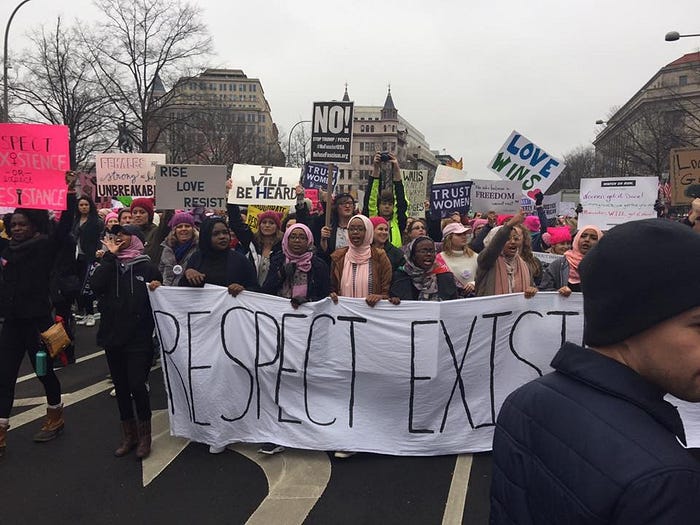Women’s March 2020 — Why We March

“We find our people. We organize. And we resist!”
Dr. Anjali Kumar
One day after Trump was inaugurated, on a brisk January morning, we gathered with other scientists, put on our lab coats, grabbed homemade protest signs, and walked down to the National Mall in Washington DC. A similar scene played out all over the world as millions of people showed up for the Women’s March, the largest coordinated protest in history.
Dr. Kim Cobb said in her speech at the Atlanta Women’s March “if we are going to fight for facts, and data, and truth, and justice, then we’re going to need ALL hands on deck.” The Women’s March felt like the beginning of something, a collective awakening. We marched to stand against the vitriol and hate that Trump’s election signified. We marched in solidarity with others who had been at the frontlines pushing for equity and justice. We marched with strangers, chanting “This is what democracy looks like!” Many of us had never been to a protest before, learning about activism for the first time because so many of us had been protected with privilege and a veil of complacency.
Dr. Anjali Kumar said in her speech at the Women’s March DC, “We find our people. We organize. And we resist! … By knowing each other and our stories we will only become more powerful.”
On that January day in 2017, we were awake and we were ready to fight for knowledge, equity, and justice. We knew things were going to get bad, but we did not know the depths of cruelty that Trump’s election would shepard in, cruelty not only in the US but across the world.
This year, as we have over the last three years, we call on scientists and supporters across the world to march in an inclusive and intersectional way. We recognize that organizing and participating in movements that seek social justice takes commitment and vision. We seek transformation of our societal and institutional norms, and that is going to take time — so we need to start now. We are not always going to agree on every detail of the changes we seek, but we must agree on the foundations:
- That social justice, diversity, equity, and inclusion are foundational in a thriving society and in science.
- That our movement must center the most marginalized among us.
- That gender and sex are not a binary.
- That trans rights are human rights.
- That science needs Dreamers and no person is illegal.
- That borders are antithetical to our shared humanity and the spirit of progress.
- That those who harass and bully have no place in society and in science.
- That decarbonization and decolonization are inherently linked.
- That evidence-based policy is central to tackling issues ranging from climate change to gun violence.
- That we must act on climate.
As we work to transform science to serve everyone, we do so with a sense of urgency. But we also recognize that change does not happen from a single march or protest. When we show up to march in solidarity with others, we are renewing our commitment to push for change every day, even when change feels unattainable. We are renewing our commitment to recognize our privilege, where it exists, and to leverage it to amplify the voices of the most marginalized among us.
When we march, we honor those who have come before us — those who have marched for their right to vote, their right to equal opportunities, their right to safety, their right to bodily autonomy, their right to peace for generations to come. We must remember that the right to protest is foundational to a just society and to 500 Women Scientists’ mission and vision for change.
- Marching is about building collective power
- Marching is about bearing witness.
- Marching is about supporting each other and the greater change we are all working towards.
- Marching is about connecting with other people — it is inherently a human enterprise.
As we wrote in preparation for the Women’s March in 2019: “Marching is the beginning, it is not the end. Every day, we work together to make a better world.”
